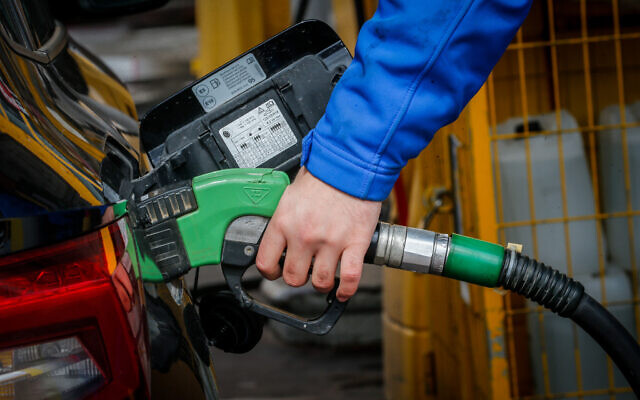Prices for a range of essential services and products went up at midnight, saddling consumers with big rises in the cost of gasoline, water and electricity, as well as other items.
The hikes come just days after the new government under Prime Minister Benjamin Netanyahu was sworn in. Coalition agreements with his far-right and Haredi partners include a commitment to reduce the cost of living.
Electricity rose by 8.3 percent — the third increase within a year, meaning the utility will now cost 20% more than it did 12 months ago.
The electricity company has blamed the rise on increasing global energy costs, with Russia’s invasion of Ukraine playing a role with the impact on fuel supplies.
Also at midnight, gasoline prices went up by 9 agorot (NIS 0.9) to NIS 6.94 ($1.97) per liter for self-service. The rise was due to the expiration of a Finance Ministry tax break brought in last year that had reduced the cost of gasoline.
Water prices will go up by 3.5%, a result of a rise in the consumer price index and the increased cost of electricity.

Illustrative image of a car being refueled at a gas station, in Jerusalem, on March 11, 2022. (Jamal Awad/Flash90)
Israel Electric Corporation CEO Meir Spiegler told Army Radio on Sunday that the price rise was a result of increased costs for fuel used to generate electricity.
He said, “When the raw material, coal, rises significantly, it cannot be ignored.”
Spiegler said it was a “much more moderate increase” than the company had sought. The IEC had initially wanted to raise the price by 15% but the previous government negotiated a lower figure.
The Ynet news outlet reported that the price rise will add NIS 80 ($22.60) to the bimonthly bill for an average household. It was unclear how that sum had been calculated.
“People will be disconnected from electricity only as a last resort,” said Spiegler.

Then-director of the National Insurance Institute Meir Spiegler speaks during a Constitution Committee meeting at the Knesset, in Jerusalem, on March 15, 2022. (Olivier Fitoussi/Flash90)
In the meantime, there is concern that the increase in the cost of electricity will have a knock-on effect, with restaurants and leisure sites all potentially raising their prices to recoup their expenditures.
Finance Ministry officials are looking at ways to reduce the electricity hike, according to Hebrew media reports. Channel 12 news reported that the Treasury could try to freeze the rise for two or three months, in an attempt to try to find a solution.
Newly installed Finance Minister Bezalel Smotrich could have extended the gasoline tax break, but that would cost NIS 200 million ($56.6 million), Channel 12 reported. The network said treasury officials believed it would be hard to find the necessary funding.
The additional cost for water is expected to be felt also in the price of fruit, vegetables and other agricultural products as growers try to offset the increased price of water. Hotels and restaurants may also raise their prices to cover their heftier water bills.

Finance Minister Bezalel Smotrich arrives for a group picture of the new government at the president’s residence in Jerusalem, on December 29, 2022. (Yonatan Sindel/Flash90)
Municipal property taxes are to go up by 1.37%, with the increase for businesses likely to be passed on to the consumer.
Channel 12 reported that some municipalities had sought an even steeper increase. Mevasseret Zion, which neighbors Jerusalem, sought to raise the tax for businesses by 5% , and the Tel Aviv municipality wanted apartments used for short-term vacation rentals to be charged at the highest tax level, the report said.
Those requests will require approval from Smotrich.
Other municipalities sought to reduce the property tax increase or even cancel it. Deciding on the matter will fall on Smotrich and new Interior Minister Aryeh Deri.
In addition, the tax on electric vehicles went up by 10% and importers have already said they won’t absorb the hike, Ynet reported.
The price hikes came as a growing list of food producers have said they will raise prices. Among those that have already either implemented price hikes or are planning to do so are food giants Osem and Strauss, and dairy producer Tnuva.
Aside from the rising prices, Israelis have also begun to notice so-called “shrinkflation,” the reduction in size of familiar packages without a proportional drop in price.
from "price" - Google News https://ift.tt/75gkvbw
via IFTTT
No comments:
Post a Comment